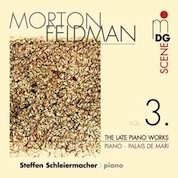Volume 3 in Steffen Schleiermacher’s survey of Morton Feldman’s late and heavenly long piano works couples Piano (1977) and Palais de Mari (1987) for at least the third time on CD. Schleiermacher’s concentrated precision and masterful control of the composer’s minutely differentiated dynamics easily supersedes Ronnie Lynn Paterson’s less-polished pianism and overly slow tempos while matching Aki Takahashi’s surface sheen and wealth of nuance.
To be certain, Takahashi benefits from closer, more immediate engineering, and Mode fills out her disc with earlier (and much shorter!) Feldman fare. Yet Feldmanites who like MDG’s relatively distant ambience will appreciate how powerfully Piano’s sudden, loud chordal outbursts and residual overtones register. And in Palais de Mari, Schleiermacher’s vocally informed phrasing and long-lined fluidity contrasts to Sabine Leibner’s more austere deliberation (both interpretations hold equal validity, yet are quite different, and I wouldn’t want to give up either one). A worthy follow-up to Schleiermacher’s previous Feldman releases.
































